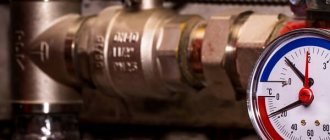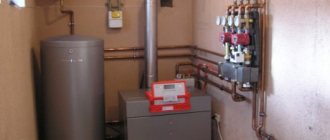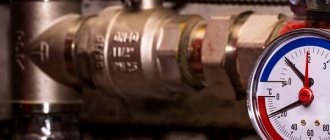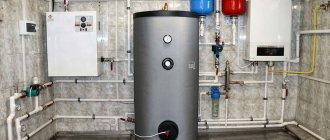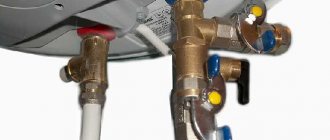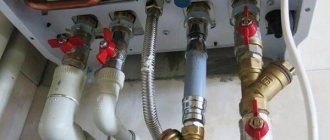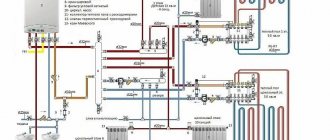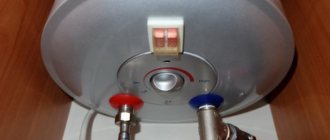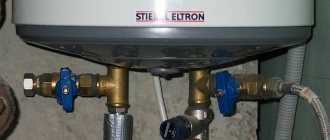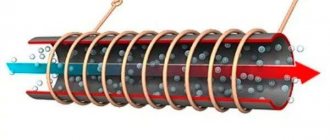Surely, everyone has noticed that in an electric kettle, after about a week or two of intensive use, a white coating begins to form, which is very difficult to wash with an ordinary sponge. This is scale. And if it can be easily removed from the kettle by boiling it with citric acid a couple of times, then a scale filter for boilers and boilers must be installed in advance and in compliance with all the necessary recommendations. Otherwise, the heating device will eventually require more complex repairs or even replacement.
Why does scale form?
Scale
In order to effectively deal with an undesirable phenomenon, you need to understand where it comes from and for what reason.
Blaming everything on utilities is not entirely correct. Yes, they are forced to add some chemical elements to the water that is supplied to our apartments, but the water extracted from a well or borehole can also contain them. Salts of magnesium, calcium, potassium and other metals are almost always present in water, and the task of a boiler filter is to reduce their content to a minimum before the water is heated. And if at the same time the filter prevents pathogenic microbes, dirt and other troubles from entering the tap, then it will be very good.
Why is it necessary to install filters?
Water contains substances such as salt, magnesium, calcium. It is because of these compounds that it becomes rigid, and plaque forms on the walls of the devices. In order to purify water from all kinds of contaminants, bacteria and viruses, filters are installed.
By installing a water purification filter, you will significantly increase the life of your water heating device.
Polyphosphate water filter
Also, one of the “enemies” of water heating devices is scale. It appears due to the fact that hard water heats up. At the initial stage of appearance, this deposit resembles a light limescale deposit; it interferes with the conduction of heat, as a result of which it takes longer to heat the liquid in the boiler.
If you do not clean at the initial stage of contamination, the layer of plaque will become thicker, and the water will heat up for an even longer time. Often at the very first stage, water with pieces of scale is released from the water heater. If you notice such formations, the device needs to be cleaned urgently.
Why install an anti-scale filter for boilers and boilers?
Anti-scale filter for boilers
The purpose of filters is not at all disinfection, although they are directly involved in this process and do a fairly good job. The main thing is to extend the service life of the water heating device. Scale, which forms primarily on the heating element, will initially reduce its efficiency. On the second, the duration of water heating will increase significantly, which will lead to unplanned consumption of electricity, and flakes, unpleasant taste and smell may appear. The third stage of scale, when the heating element is completely covered with a thick layer of deposits, will lead to its burnout and then it will be necessary to change not only the filter for water purification, but also the heating element itself.
To avoid all these gradually accumulating troubles, they install a water filter, because it is always better to prevent a breakdown than to repair it later.
Polyphosphate filter: description, characteristics, types and reviews
Tap water in each region has its own hardness level. And the softer the water, the less scale remains on the heating elements of household appliances, such as an electric kettle, washing machine, heating boiler, etc. To reduce the amount of nitrates and extend the life of expensive equipment, it is recommended to use special protective systems. Polyphosphate filters are popular fighters against the formation of scale and other chemical deposits on important elements and components of water heating equipment. According to experts, equipment that is used in conjunction with cleaning devices requires repairs much less often than devices that use untreated tap water.
Purpose and application
First of all, it is worth noting that polyphosphate filters are used everywhere and are quite affordable for purchase. The most important thing is that, apart from periodically replacing the crystals themselves, no additional maintenance is required for the device. The device reduces the rate of scale formation, thereby preventing the breakdown of components and heating elements, a common cause of malfunction of which is the formed scale.
A polyphosphate filter for a boiler, according to user reviews, is the most affordable option for purifying water and extending the service life of equipment.
What does the structure consist of?
The polyphosphate filter itself has a simple design:
- Lid.
- Main flask.
- Drain.
- Filler.
The whole process begins with water entering through the lid, and after passing through filtration, it exits through the drain and enters the water heating equipment. Before purchasing a filter, it is important to clearly understand for which device it will be used in the future. Since each device has its own separate modification. Today's models can contain both granular and powder filler.
Unfortunately, in many regions of our country it is not possible to drink tap water in its original form. Often its composition exceeds the content of heavy metals and phosphates. To preserve the health of consumers, water undergoes multi-level purification. Speaking about the water hardness indicator, it is worth noting that it does not cause any harm to humans. But for technical devices, water whose hardness is too high can become a fatal cause of failure.
When water enters a polyphosphate filter, it passes through a filler - sodium salt. Polyphosphates instantly begin to replace each other, enveloping hard salts, as a result of which the process of scale formation slows down.
Kinds
The modern market provides consumers with a huge selection of water purification devices. The filler can either be poured into a separate capsule through which water will pass, or placed into the technical device itself.
By design, cleaning systems are divided into:
- Flow-through.
- Dosing filters.
Filter installation
The consumer does not always purchase and install a cleaning system together with the water heating device. Often, a water heater, boiler, washing machine or dishwasher is used without additional filtration of the incoming water. Therefore, after purchasing a polyphosphate filter and installing it, it is necessary to clean the heating elements from scale using special chemical compounds.
Non-abrasive solutions, which are purchased along with flushing liquids and connected to the heat exchanger, are suitable as cleaning agents for a water heater or boiler. Under the influence of high temperatures, the reagent begins to act and has a destructive effect on scale. Afterwards, the liquid must be drained, the device and heat exchanger must be washed, and the structure must be disconnected from the heater.
Afterwards, the cleaning device itself is installed. The method is determined depending on the type of device with which the system is used. For example, a polyphosphate filter for a washing machine is attached to the inlet hose. The same system is also used to purify water for boilers. Due to their small size and simple design, polyphosphate filters, according to user reviews, are quite easy to install. Their maintenance also does not require special knowledge and skills; it is enough to change the filler on time. You can purchase it in specialized stores.
Main advantages
A polyphosphate filter for a boiler and washing machine is recognized as the best and most cost-effective option for preventing scale formation, thanks to:
- Easy installation.
- Small sizes.
- Easy maintenance.
- High-quality fillers.
Disadvantages of use
If we talk about polyphosphates, which are used to protect the washing machine, then in this case there are also disadvantages. When choosing models that are too cheap, you have to pay attention to a decrease in water quality and the absorption of a large amount of resources. As a rule, without additional cartridge replacement, the maximum service life is about six months. The film that forms during the chemical reaction quickly dissolves under the influence of hot water. Accordingly, when choosing a washing mode, the water heating should be no more than 55 degrees.
It is also worth taking into account the fact that with the active use of a polyphosphate filter, deposits of calcium and other salts may form on the sides. Unfortunately, getting rid of them is not so easy. Leaving them on the surface of a boiler or washing machine is also not recommended, since if the layer becomes too large, it will negatively affect the operation of the device. It is also important to note that polyphosphate water filters with a large storage capacity and salt content should never be used to purify drinking water or for prolonged contact with the skin.
Is the filter harmful to health?
It is important to understand that water that is purified using such a filter becomes technical and cannot be used for drinking or cooking.
Speaking about how harmful such a filter is for health, one thing can be said: it is undesirable to use it for direct consumption, since it is a chemical reagent, and accordingly, it is simply impossible to drink water from under such a filter. However, if you put your hands in it if necessary, a chemical burn will not occur due to the low concentration.
To ensure maximum protection of expensive equipment, it is recommended to periodically check the amount of reagent. If less than half of it remains, then it is best to completely replace the composition. Otherwise, the degree of protection begins to weaken.
When seeking advice from specialists, we can say that to ensure safe operation it is best to use a powder reagent. It actively fights not only scale formation, but also corrosion, which often affects heating elements. If the affected area becomes too large, this may lead to the need to completely replace the heating elements of the equipment.
Conclusion
Polyphosphate filters are the best option for protecting household appliances from scale. They are affordable and easy to install. Replacement of the filler, as a rule, is carried out no more than once every six months.
fb.ru
Types of filters
Polyphosphate filter for boiler
Depending on the composition of the water entering the house or apartment, and the presence of microelements in it, three types of filters are installed:
- Deep cleaning filter. It is installed at the very starting point of the water supply to filter the water, which will then go throughout the house. Works well on sand particles, rust flakes and other types of dirt and debris.
- Fine filter. There are two varieties:
- With fabric wrapping.
- Mineral.
They fight salts of chlorine, potassium, calcium, magnesium and other chemical elements.
- Biological filter. A multi-stage system, which is used in most cases in private homes where water comes from a well or well.
You should not think that just install a water filter once and water treatment will end there. For a while, yes. But no one canceled filter maintenance. And although in most cases it comes down to replacing cartridges, this must be done on time. Some filters should be changed after a certain period of time, some, such as those with fabric winding or mineral ones, will themselves be signaled by a change in color.
Polyphosphate filter
Depending on the pressure and amount of incoming water, the filter throws the required amount of food polyphosphates into it. As a result of their activity, a film is formed that prevents scale from accumulating on the heating elements.
Due to its low cost and ease of production, this filter is the most popular. Its service life is relatively short - only six months.
Constant replenishment of content can also be considered a relative inconvenience in maintenance.
Magnetic filter
A magnetic filter should be installed even if you do not use a water heater at home. The magnetic field in the filter, mounted directly into the pipe, affects the ionic ratio of salts, turning them into a completely safe precipitate, which is easily washed out of the devices with a current of water. And it does not affect their work or human health in any way.
One of the few water filters that does not require special periodic maintenance.
Filter with ion exchange resins
Filters of this type appeared not so long ago, but have already firmly occupied their niche. They are filled with a special resin composition that neutralizes almost any impurity. Knits them and then dissolves with them without a trace. The manufacturers of these filters claim that the device is very effective, durable and will give a hundred points ahead to all other types of filters. A short experience of using these filters proves that they are right.
Do I need a filter for a water heater?
The quality of tap water directly affects the life of the heater, especially if it is constantly in use. The water must be “soft” and meet the following requirements:
- Transparency.
- No unpleasant odors.
- Minimum content of metal salts, hydrogen sulfide.
- No bacteria.
Achieving such indicators is not easy. Water often contains heavy magnesium and calcium salts: settling on the boiler elements, they reduce thermal conductivity. As a result:
- A large amount of electricity is wasted.
- The water takes a long time to heat up.
- The contents become cloudy.
- The heating element burns out.
When hard water is heated, scale is produced - at first a small deposit. If it is not removed at this stage, then the heating element is covered with limestone.
If you are not in the mood to buy a filter or you do not have the opportunity, you must carry out the following procedures:
- Regular inspection of the internal elements of the tank.
- Cleaning the walls and heating elements.
- Replacing the magnesium anode.
Then you will do this more and more often: you will not only waste your time and effort, but also spend money on cleaning products. Just imagine, at least once every six months you will need:
- Drain the water from the tank.
- Dismantle the heating element by disassembling the fastenings.
- Remove the housing cover and clean the walls from plaque, clean the heater.
In this case, there is a risk of damage to one of the parts. Isn't it easier to improve water quality than to endure such consequences?
Cleaning the water heater
Citric acid, which does such a great job of removing scale in an electric kettle, would probably do the job here too. But putting it into a boiler or tank is much more difficult than pouring it into a kettle. And cleaning a water heater that has worked for some time without a filter or while replacing the filter is sometimes simply necessary.
Dismantling, disassembling and washing by hand means spending a lot of time and effort. But there is another way out. In specialized stores you can find a cleaning system that is easily connected to the heat exchanger. They are designed in such a way that after connecting, all that remains is to heat the reagent contained inside, which the water heater itself will do, turn on the circulation and then drain the water.
After this, you can safely install the filter and enjoy clean water at any time of the year, regardless of the preventive and emergency work of utility workers. The main thing is not to forget to periodically look at the condition of your water purifying assistant and give him preventive maintenance on time. This, in turn, will ensure long and uninterrupted operation of your boiler.
Which filter is better to choose?
To make your task easier, we have compiled a selection of filters that users have responded well to. Now you can choose which product to install to protect against scale.
Svod-AS
The reagent contained in the flask is called “food grade”. It does not allow scale to crystallize, so it does not settle on surfaces. In addition, the action of the reagent allows you to remove already deposited plaque.
Suitable for hardness level: up to 34.
- Operates at 105 degrees.
- After purification, the water becomes potable and complies with GOST. Can be safely used for household purposes.
- Easy to install.
- Replacing the filler is easy.
For example, the Svod-AS 10/250 model is designed for 42,000 liters. Connects to ½" thread. Usually installed on a tee.
The Vault 5/100 model has a resource of 15,000 liters, and the pipe diameter is ¾ inch.
Geyser 1 PF
Installed in front of the water heater.
Works on the basis of polyphosphate salt. Dissolving in water, polyphosphate binds impurity ions so that they do not precipitate. The transparent flask allows you to monitor the amount of salt inside.
